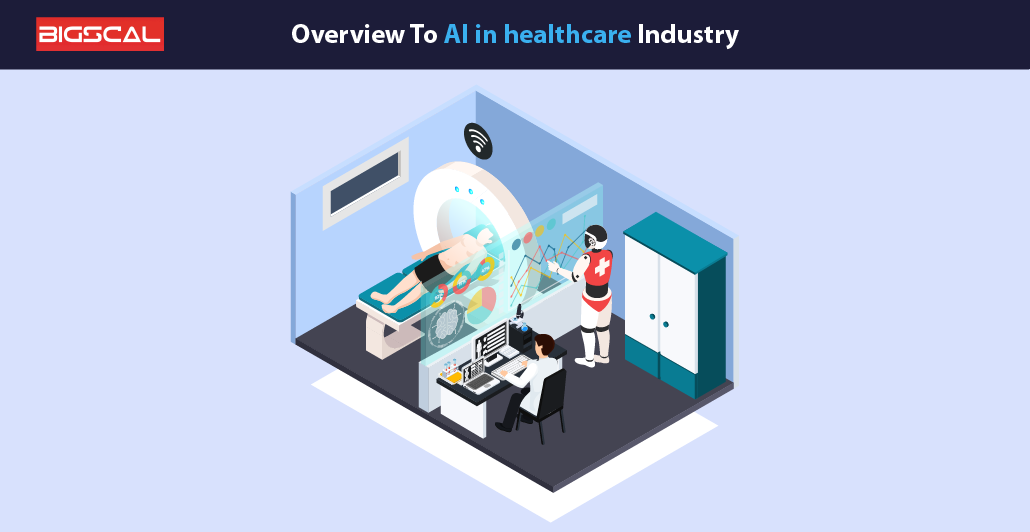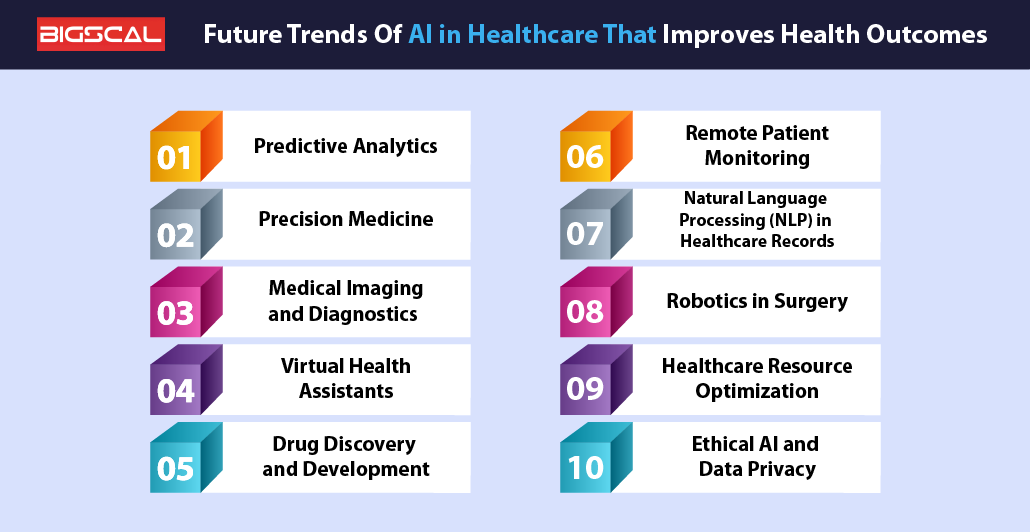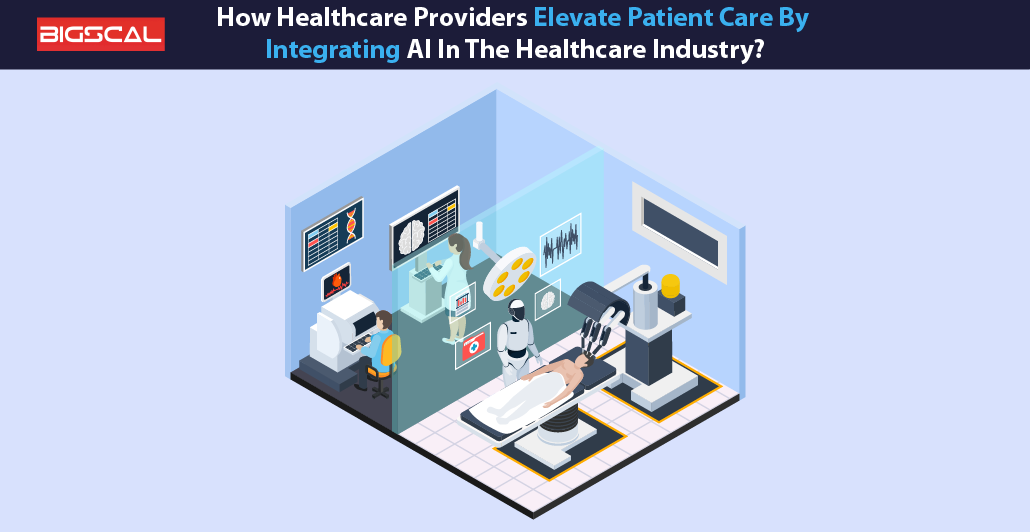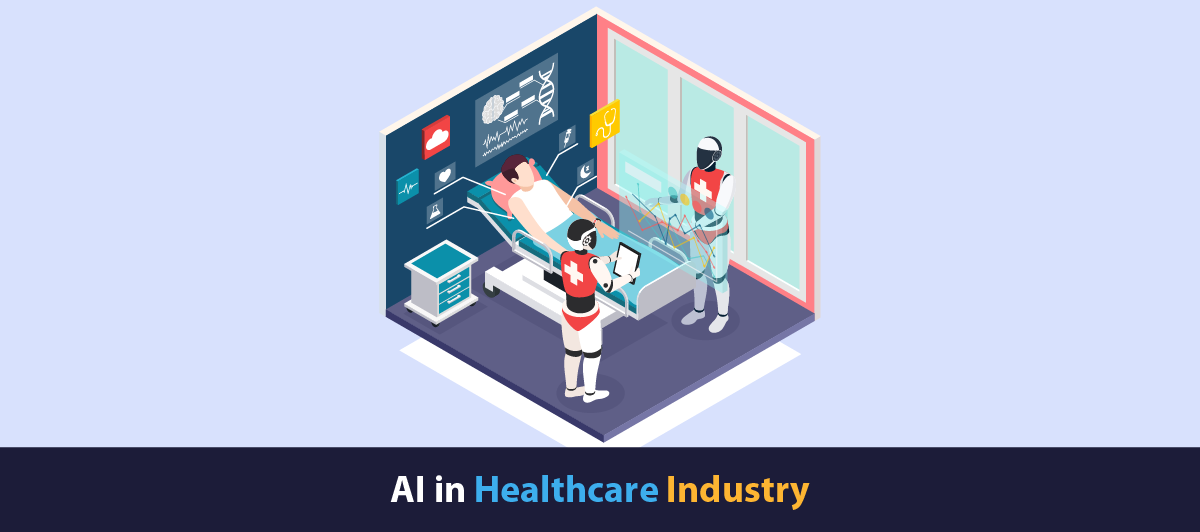Elevate Patientcare By Utilizing AI in Healthcare Industry
Quick Summary: This blog discusses how artificial intelligence (AI) can improve patient care in healthcare. By leveraging AI, both healthcare organizations and providers can streamline administrative tasks. It helps to reduce errors, and enhance the overall patient experience. This integration of AI in the Healthcare Industry aims to optimize resources, improve efficiency and deliver better health outcomes for patients.
Introduction
In an ever-evolving healthcare realm, artificial intelligence (AI) integration stands as a top and it is transforming patient care in amazing ways. A world where physicians are using AI in the Healthcare Industry to streamline administrative tasks. Additionally, they use it to enhance the accuracy of diagnosis, treatment planning, and patient outcomes.
Healthcare Software Development with AI’s ability to analyze vast amounts of medical data with lightning speed and accuracy is hardly a miracle. It empowers healthcare providers with predictive analytics. It is helping them anticipate and prevent potential health problems before they become serious. AI-powered tools can personalize treatment plans based on individual patient data, ensuring highly customized and effective interventions.
Furthermore, AI doesn’t stop healthcare providers only at clinical applications. It also extends to productivity. From optimizing resource allocation to enhancing patient experience with intelligent virtual assistants, AI is revolutionizing every aspect of healthcare delivery.
So, let’s understand it deeply by reading this article!
Overview To AI in healthcare Industry

AI, which is an emerging area in healthcare, allows doctors to make better decisions. It is making health care operations and processes of doctors easy as well as facilitating the diagnosis. The AI-powered predictive analytics in the healthcare system become a powerful tool when they are used to forecast the epidemics as they examine the patient data with this purpose in mind. Furthermore, it is tailored concurrently (for optimum treatment regimens and patient – specific care). This method for patients results in wise care which in return optimizes development and avoids unnecessary hospitalizations.
Natural Language Processing (NLP) empowers AI machines of processing language regularly, interpreting text and generating data that mimics human beings. It helps in coding and analysis of patient health records which also yields a less administrative workload for healthcare personnel.
Powered with AI, virtual health assistants with chatbots function 24/7 to provide patients with support that answers medical questions and schedules appointments. Through these, it capitalizes on the reduction of episodes and increases the patients’ health outcomes improving patient engagement and satisfaction.
While integrating AI into healthcare helps in the cautious area, concerns including data privacy concerns, algorithm bias, and compliance issues are presented for medical providers. Dealing with such obstacles goes a long way to guarantee that AI will not just transform, but improve the health care delivery system. It helps with the setting up of the better and happier end in the agreement as well as improves medical research.
Read more: How Patient Relationship Management Software Helping The Healthcare Sector
Future Trends Of AI in Healthcare That Improves Health Outcomes
Before knowing the ways AI elevating healthcare, let’s read about what future holds for AI in healthcare systems:

Predictive Analytics
In healthcare, predictive analytics use of AI and artificial intelligence try to look to patient data to predict possible health outcomes. Through the study of latest data and patterns, AI and deep learning methods make automobile driving more intelligent. It helps healthcare professionals to predict health problems, to devise varied treatment regimens and to reduce mortality indices among patients.
Precision Medicine
Personalize treatments and interventions with genes, lifestyle, psychology and environment just for the patients. Using AI technology, the computer can get a precise determination about treatment regimens. This is based on an extensive analysis of huge amounts of information. This strategy is well considered, taking the minimum possible side effects and diagnostic paperwork in mind. It is uniquely built for each patient’s specific needs.
Medical Imaging and Diagnostics
Medical imaging and analysis using AI increases the accuracy and efficiency of health diagnosis and treatment. Machine and deep learning algorithms are able to analyze medical images such as X-rays, MRIs and CT scans to detect abnormalities, tumors, or other health problems more accurately than conventional methods. This allows for quicker detection, and it leads to timely intervention and better health outcomes for patients.
Virtual Health Assistants
These EHR and EMR software are AI-powered systems or devices designed to help patients manage their health. They can schedule appointments, provide medication reminders, provide basic medical advice, and even monitor vital signs. Virtual health assistants aim to improve patient engagement, streamline healthcare delivery, and provide timely support, especially for chronic disease management or clinical decision management.
Drug Discovery and Development
AI plays a vital role in accelerating the discovery and development of new drugs. By analyzing large amounts of data, AI systems can identify potential drugs, predict efficacy, and even simulate clinical trials. This leads to faster and more effective drug development, and ultimately it benefits patients by providing early access to alternative treatments.
Remote Patient Monitoring
With the help of AI, healthcare providers can remotely monitor the health status of patients in real time. AI algorithms can analyze data from wearable devices, sensors, and medical records to identify early warning signs, track progress, and intervene when needed. Remote monitoring of health data of patients increases access to health care, reduces hospitalizations, and improves overall health outcomes by improving efficiency in proactive and personalized care.
Natural Language Processing (NLP) in Healthcare Records
NLP in healthcare involves teaching computers to understand and process human language. This facilitates quick and accurate analysis of large amounts of medical data, such as patient and medical records management and research papers. Using NLP, healthcare professionals can gain valuable insights, improve diagnostic accuracy, and improve patient care.
Robotics in Surgery
Robotics in surgery refers to robotic systems used to assist doctors during surgical procedures. These systems provide accuracy, dexterity and minimal invasiveness, leading to shorter patient recovery times, improved health outcomes and lower risk to patients. Doctors can precisely control the robotic arm. It makes complex surgeries more manageable and improves overall surgical effectiveness.
Healthcare Resource Optimization
This trend focuses on the use of AI to optimize healthcare infrastructure such as personnel, equipment and facilities. AI algorithms can analyze data to predict patient outcomes, efficiently allocate resources, and streamline workflows world health organization. This reduces waiting times for healthcare providers, improves patient experience and saves costs.
Ethical AI and Data Privacy
Ethical AI in healthcare ensures that AI systems are designed and developed responsibly, respecting patient privacy and confidentiality. This includes implementing strong data protection measures, obtaining informed consent for data use. It ensuring transparency in the AI decision-making process. Ethical considerations of first AI can increase the trust of patients and healthcare providers while protecting sensitive information.
Read more: When Was Telemedicine Invented? History Of Telemedicine
How Healthcare Providers Elevate Patient Care By Integrating AI In The Healthcare Industry?
Here are some ways in which AI I technologies is elevating Patient Care By Integrating it into The Health care sector:

Enhanced Diagnostics
AI in the healthcare industry has revolutionized diagnostic testing by delivering unparalleled accuracy, speed and productivity. AI-powered diagnostic tools can analyze vast amounts of patient data. This includes medical records, lab results, imaging, and genetic information. These all identify patterns and detect abnormalities which human physicians may not recognize.
The main advantage of AI in research is its ability to process complex data in real-time. It allows healthcare professionals to conduct research faster and more accurately. Machine learning systems can learn from past data and move on to improve their assessment capabilities. It provides better outcomes for patients.
Additionally, AI applications can help diagnose diseases and conditions faster, providing timely intervention and improving prognosis. For example, AI algorithms can analyze medical images such as X-rays, MRIs and CT scans to identify subtle signs of diseases. Such diseases include cancer, arthritis and cardiovascular issues.
Personalized Treatment Plans
AI brings in a dream of a personalized treatment plan through which a patient can make various choices by considering both the medical history and preferences. It works with the database and predicts future events. With this, it suggests those treatments that are indicated as per evidence-based protocols and clinical best practices.
AI-based personalized medicine administration, among many things, is highly efficient in delivering to patients outcomes with improved quality. One should acknowledge the unique traits, such as genes, way of living, comorbidities, and effect of treatment, in their plan. It is possible for health professionals to achieve the best outcomes for their patients through quality delivery of care as well as controlling side effects.
Moreover, AI enabled treatment programs have a tangible effect on improving constant preventive healthcare options. For instance, and in particular in patients with chronic diseases such as diabetes, hypertension and asthma. AI algorithms can visualize critical patient data and track the development of their condition, spotting risk factors. Creator: Lidia Castillo Moreover, their healthcare personnel should make intervention or avoid that would make a case deteriorate or develop into near death.
The third benefit highlighted here is the capacity to use patient information in treatment or policy choices. AI tools can then scan through the self-reported results, the scores of satisfaction, and the compliance in order to optimize the therapy plans and enhance the patient-doctor interactions.
Remote Patient Monitoring
The use of RPM or Remote patient monitoring is undoubtedly a revolutionary concept that is based on AI technology to enhance patient care. Furthermore, it gives healthcare providers an option to track and monitor patients’ vital signs from a distance by means of remote health data retrieval. With the use of wearable devices, sensors, and mobile applications, RPM continuously tracks vital signs, medication adherence, and other heath stats in real time to gather the data. Last but not least transfers this information to Healthcare workers that are at risk. It cuts down the number of days and enables one to be able to best intervene when needed.
Artificial intelligence as an intelligent assist for remote monitoring applications gives doctors an opportunity to examine masses of patient data faster and to a higher accuracy level. AI-algorithms are able to discern patterns, tendencies and anomalies in data. And this way allow doctors and other healthcare personnel to detect diseases and provide early diagnosis and treatment.
It is informing for those diagnosing patients early, even before it gets as serious. AI-furnished devices for instance can reveal patient’s disease severity growth in the early time. It allows healthcare providers to attend to the clinics promptly that will not result to patient readmission or complications.
Moreover, AI-enabled RPM enhances patient care by enabling earlier monitoring. Earlier intervention, and personalized treatment planning. It promotes positive patient outcomes, reduces healthcare costs. It improves overall patient satisfaction by providing ongoing and comprehensive care outside of traditional healthcare settings.
Efficient Administrative Tasks
Adoption of AI by the health care industry is the basis for the improvement of clinical services that are performed in health care and also automates human resources. Now, let me discuss an area where AI really shines – that is, in the course of streamlining business processes. Artificial intelligence using automated systems can execute jobs like scheduling meetings, taking payments and paperwork, insurance claim processing, etc. This not only decreases the administrative hustle but also the opportunities for errors on manual inputs.
Moreover, AI algorithms can run through big data to find any patterns found. Thus, giving healthcare personnel a chance to make decisions based on relevant data. One example is the use of AI to anticipate service demand from patients which reduces expenditure on unnecessary services and minimizes fraud and billing errors.
Automation of business operations and providing recommendations based on the gathered data are the key positives points of AI implementation. Developing artificial intelligence gives healthcare professionals room to put their focus mainly on patient care. To illustrate, one of the most significant roles of primary care and specialty care in health care. This is to facilitate delivering health care effectively and efficiently throughout the population in general.
Drug Discovery and Development
Thanks to AI, there has been great progress in drugs and medical treatments. It eliminates lengthy time periods and provides the best results. Conventional drug research is very time-consuming. Additionally, it is an expensive process that might require several years and several billions of dollars till a new drug will be available for broader use. AI technologies including machine learning, deep learning have become a fundamental tool for medical research due to the sole reason that it allows researchers to sift through a big pile of medical data in no time.
AI algorithms can also mimic clinical trials to find out the drugs. Which have high chances of being effective, and then monitor safety and efficacy of the obtained drugs. Hereby, drug development time scale is shortened substantially, and costs are minimized.
Alternatively, AI techniques implemented in medication changes the approach to personalized medicine. It is the place in which treatments can be personalized according to the genetic disposition of the patient. This ecosystem is characterized by better results manifested in lack of side effects as well. In turn, this fosters a positive trend in healthcare.
Improved Communication
AI in the healthcare industry greatly enhances communication between healthcare professionals and patients. AI-powered tools like chatbots and virtual assistants streamline administrative tasks, freeing up healthcare professionals’ time to directly care for patients. These tools can schedule appointments, answer frequently asked patient questions. It can also send reminders to various pits in terms of medication and follow-up time. Thereby improving patient engagement and satisfaction.
Additionally, AI-powered communication tools are capable of translating and translating languages, facilitating communication with patients from different cultures. This ensures that critical medical information is provided and understood accurately. It leads to better clinical outcomes and patient compliance.
Clinical Decision Support
AI will play an important role in clinical decision support by analyzing vast amounts of patient data. This data provides evidence-based recommendations to healthcare providers. Machine learning algorithms can identify patterns and trends in medical records, diagnostic images, and genetic data. This helps clinicians accurately diagnose disease and create customized treatment plans themselves.
Furthermore, AI-powered decision support systems can alert healthcare providers to potential drug interactions, patient allergies, and adverse events. It increases and decreases patient safety over medical errors. This proactive approach enables healthcare teams to deliver more accurate and efficient care. It ultimately improves patient outcomes and greater.
Continuous Learning and Improvement
One of the most important benefits of integrating AI into healthcare is its ability to keep learning and improving over time. AI algorithms can analyze outcome data, patient feedback, and clinical practice to refine diagnostic accuracy, treatment planning, and care delivery.
By harnessing AI for continuous learning, healthcare providers can stay up to date with the latest medical advances and guidelines. It ensures that patients receive timely care. Additionally, AI-driven predictive analytics can predict disease progression, resource utilization, and patient outcomes. This all enables healthcare organizations to optimize resource allocation and improve efficiency.
How Bigscal Technologies Helping Healthcare Sector By Providing Apps With Artificial Intelligence
If you are seeking Healthcare Software Development Companies to integrate the AI into your healthcare software then look no further than Bigscal Technologies!
At Bigscal Technologies, we are revolutionizing the healthcare industry by leveraging the power of artificial intelligence (AI) through our innovative apps. Our AI-powered applications are designed to streamline the various processes in the healthcare industry, increase efficiency and improve patient outcomes.
One of the main areas where apps excel is medical diagnosis and treatment planning. Using machine learning, our apps are able to quickly and accurately analyze vast amounts of medical data. It helps healthcare professionals make informed decisions. This not only speeds up the diagnosis but also helps create individualized treatment plans tailored to each patient’s specific needs.
Additionally, our AI-powered apps also support patient engagement and management. Features such as chatbots for answering frequently asked medical questions. It provides medication reminders and virtual consultations are providing better communication between patients and healthcare professionals. This all improves the overall healthcare experience.
Conclusion
The integration of AI into the healthcare industry has tremendous potential to improve patient care. Through advanced technologies such as machine learning and data analytics, healthcare professionals can perform more accurate diagnoses, personalize treatment plans. They can also improve overall patient outcomes.
AI-enabled tools also provide administrative tasks that are convenient, allowing health care providers to focus more on patient communication and care delivery. However, it is important to ensure ethical practice, data confidentiality, and ongoing training for healthcare professionals to maximize the benefits of AI while maintaining reliability and transparency. Through continuous improvement and responsible use, AI promises to transform patient care and enhance the healthcare experience for all.
FAQ
What are clinical best practices?
Good clinical practice refers to established standards and guidelines in health care that are evidence-based, patient-centered, and promote optimal outcomes while considering safety, efficacy, cost-effectiveness, . and of moral considerations
What is clinical documentation?
Clinical documentation refers to the process of documenting patient health information, including medical history, diagnoses, treatment plans, and outcomes. It is essential for communication between healthcare providers and maintaining accurate patient records.
How to undertake substantial integration projects?
- Conduct Appropriate Integration Activities
- Set Clear Objectives
- Secure Appropriate Resources
- Involve Stakeholders, Plan Effectively
- Implement Effective Communication Strategies
- Manage Risk Quickly, Monitor Progress
- Make Adjustments As Needed To Make The Integration Successful.
How is artificial intelligence responsible in healthcare?
In healthcare, artificial intelligence supports disease diagnosis, personalized treatment planning, predictive analytics, workflow optimization, and administrative tasks. It all improves efficiency, accuracy, and what from patients while reducing costs and workload on health care providers.
How does AI reduce human error in healthcare?
AI reduces human error in healthcare by providing decision support systems, automating repetitive tasks, flagging potential errors or inconsistencies in data. It enhances accuracy in diagnosis, treatments, and medication management.







